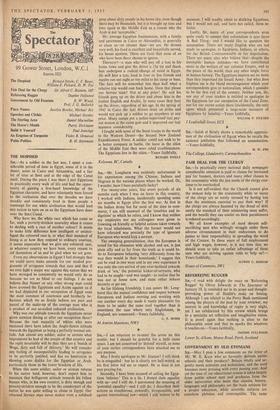SIR,—Mr. Longhurst was evidently unfortunate in his experiences among the
Chinese, Indians and Negroes in the various places where he worked. Or, I wonder, have I been peculiarly lucky?
For twenty-nine years, less seven periods of six months each when I was on leave in this country, I worked with Indians, incidentally spending some six months in Egypt after the first war. At first in the Indian Army but for most of the time in com- merce, I am still unaware of the `cruelties and in- dignities' to which he refers, and I know that neither my employers nor my colleagues were given to frowning on friendly or helpful actions taken towards the local inhabitants. What the former would not have tolerated was precisely the type of ignorant European who would kick a servant.
The sweeping generalisation, that the European is noted for his obsession with alcohol and sex, is just plain silly and as far from the truth as it could be. As to Europeans behaving 'very differently from the way they would in their homelands,' I suggest this can be read in two ways and in my own experience it was only the rare arrival of one over-inclined towards drink or 'sex,' the potential kicker-of-servants, who had to be taught—and was taught—to realise that he was not at home now, and must either behave decently or get out. As for lifelong friendship, I can assure Mr. Long- hurst that the mutual confidence and respect between Europeans and Indians meeting and working with one another every day made it vastly pleasanter for them to be under the same roof together than is sometimes the case where only Englishmen, in England, are concerned.—Yours faithfully,
44 Antrim Mansions, NW3 C. F. BUSER


































 Previous page
Previous page